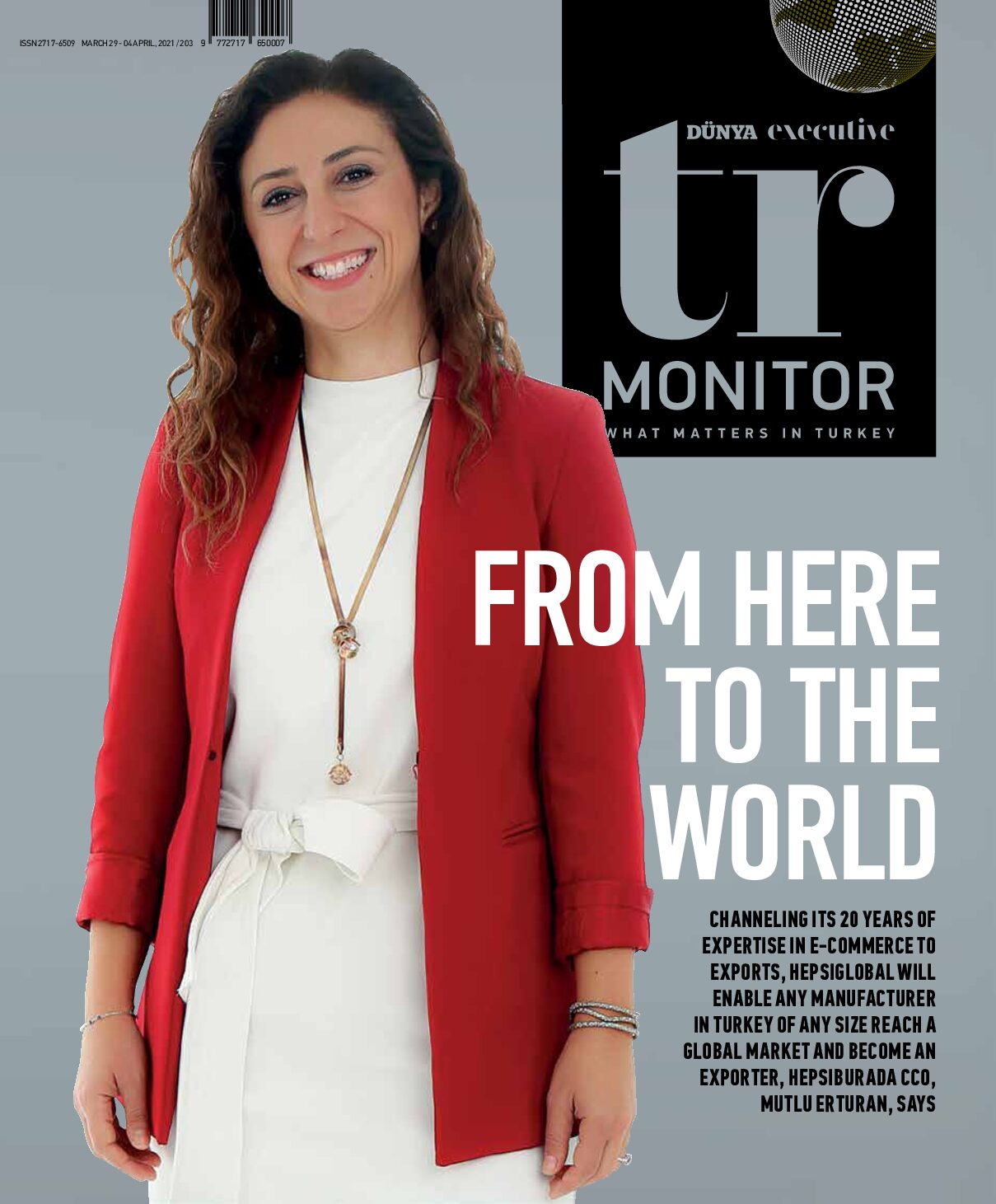By HUSNIYE GUNGOR
WHAT EXCITES Hepsiburada CCO Mutlu Erturan nowadays is the digital content platform she is working on, which will be a first in Turkey. The company is also working on another platform that will enable producers to sell directly to customers in any part of the word. Both new projects, to be launched in April, will also mark the 20th anniversary of the online marketplace, which has been in e-commerce since the early days of the sector.
E-commerce was one of the fastest growing sectors even before the pandemic. But this acceleration gained speed with COVID-19. The sectors targets for 2023 were reached by the end of 2020. In that sense, the pandemic has put the sector three years ahead.
Prior to the pandemic, the share of e-commerce in total retail sales was 5-6% but it has since reached 10%. Normally growing by an average of 35%, the sector achieved 64% growth in Turkey last year. In the first six months of the pandemic alone, which was officially declared in March 2020, 3.5 million new credit cards were used in e-commerce. This is an incredible increase, considering 12 million credit cards were used in total in the last 20 years, according Erturan.
“The outlook is a little bit different with global e-commerce growth,” she says. Global growth stood at 10 to 15%, due to two reasons, she adds: “The first is the existence of more mature markets like China, Korea and the U.S. with already high penetration levels. And there are also less mature countries like African countries.” That’s why the global growth rate could only increase to 17.5% last year, reaching USD 5tr total volume.
The reasons behind Turkey’s relatively higher growth rate is the country’s ability to adapt quickly and differentiate in the service it gives. “Canada,” Erturan notes, “one the most-developed countries in terms of e-commerce, faced serious problems in deliveries during the pandemic. The cargo systems in the country collapsed.” Turkey responded to the new conditions very well and improved services accordingly, resulting in faster growth.
SELLERS INCREASE BY 40%
To be more precise, the sellers on hepsiburada.com alone increased by 40% in 2020. Erturan says that sellers already on the hepsiburada.com platform increased their sales with the start of the pandemic, then 35,000 new businesses, which never tried e-commerce before, came onto the platform. “64% of these merchants expect an increase in their e-commerce sales even after the pandemic.”
During the pandemic, the first priority was to protect employee’s health and serious measures were taken in this regard. “We even contacted our business partners in China to learn about their experiences with the pandemic,” Erturan notes. This helped them to have the least possible people infected with COVID-19. That is also how new investments were made real.
The rapid expansion in the sector also accelerated investment plans, and even new investment areas emerged.
ACCELERATED DELIVERY INVESTMENTS
Delivery, for example, gained in importance and the current capacity of cargo companies fell short of the needs of the new market conditions. Thus, Hepsiburada accelerated investments for its own delivery company, hepsiJET and established it in 51 cities instead of the 31 in the original plan. This also increased employment with the delivery team of hepsiJET reaching 1,200 people.
By the end of this year, Ertutan expects hepsiJET to be offering its services to all of Turkey. “We already reach more that 50% of our customers with hepsiJET. The delivery service is also available for the sellers on the platform,” she says. This provides companies same-day delivery service (or next day at the latest) to 60% of customers, no matter where in Turkey they are.”
“There also have been problems with returns. Cargo companies started to refuse returns due to their increasing work load. Hepsiburada customers were able to get their returns taken from point of service with hepsiJET, no matter with which cargo company they placed an order.”
LOGISTIC CENTERS INCREASE
As being fast became important more than any time during this period, Hepsiburada also established five new logistic centers in Ankara, Izmir, Adana, Diyarbakir and Erzurum during the pandemic. This increased the number of warehouses to six while the total depo area reached 20,000 square meters, in addition to 100,000 square-meter depo in Gebze, Istanbul, which used to serve all of Turkey. “The aim here was to shorten delivery times for basic consumption goods, mainly food. This enabled same-day delivery in these segments. Currently with our 6 logistics center we can deliver in 24 hours in 81 provinces,” Erturan notes.
The company also invested in Hepsiexpress, a fast (one hour) market delivery service, which gained popularity among consumers during the lockdowns. Establishing a food delivery service, on the other hand, is still on the company’s agenda. The latest launch of hepsiburada.com was Hepsifly, an online air ticket sales platform, which got approval from Association of
Turkish Travel Agencies (TURSAB) in mid-March and started actively selling tickets last week.
Hepsiburada also gives logistics services (HepsiLojistik) to its clients who face difficulties due to their increasing sales. “That enables them to collect and deliver their goods faster and with more affordable costs,” Erturan says.
HepsiAd, a digital marketing tool, was also developed for the use of sellers on the platform to promote their products to consumers making more than 200 million monthly visits to Hepsiburada.com. “The payment system we started in 2016, HepsiPay will adopt the world’s best payment systems and applications. Sellers will be able use them but also more developed wallet and digital payment methods will be developed under this brand in the coming period,” Erturan states.
MAKING ‘ANYONE’ AN EXPORTER
Hepsiburada is also eager to contribute to Turkey’s exports with its 20-year expertise in e-commerce. The e-export platform the company launched in 2020, Hepsiglobal had been on their agenda even before the pandemic, Erturan notes. “According to 2019 data,” she explains, “65% of global e-commerce shoppers made overseas orders, showing us the level globalization has reached.” Turkey is globally well-known and respected in certain product segments such as textiles and tableware products.
“The manufacturer of these quality products are already sellers on our platform, and there is a global demand for these products. We started Hepsiglobal to enable them to start e-exports.” When they get an order from abroad, Hepsiglobal runs all the operation from customs clearance to door-to-door delivery as will dealing with returns operations. The business had to slow down, according to Erturan, with the start of the pandemic due to border closures but picked up steam with the re-opening of customs. Two weeks ago, with this initiative, Hepsiburada was recognized by the “Value Summit and Brands Add Value to Turkey” organization, which rewards the brands that provide added value to the national economy.
EXPORTING TECHNOLOGY
Communication and information technologies will also continue to further develop, Erturan notes. “That’s why we call ourselves a technology company more than anything.” As the needs of e-commerce differ according to country, the company initially found that their technology investments did not meet the competence levels they desired. Hepsiburada then created its own software with its own resources. “There is a serious optimization algorithm running after our services. All of the technology we created, from marketplace to data and analytics, can be used in different parts of the world.” Thus, technology exports are among the goals of the company, which wants to be the best technology company in a wider geography “from the west of Indian to east of Germany.”
The most exciting project Hepsiburada is currently working on is a digital content platform, a project which was never been attempted in Turkey before. The company is also working on another platform in coordination with some ministries that will enable producers to sell directly to customers in any part of the word. Both new projects, to be launched in April, will also mark the 20th year of the company. Growing organically for 20 years, Hepsiburada is open to mergers and acquisition, “but if only it adds value to the business,” as Erturan puts it.
“It has been a hard year for everyone especially with the risk of losing lives with the pandemic” Erturan says. “But we learned that there is not a single answer to existing problems. The pandemic taught us that to be successful, we have to be adaptable.”
A SMALL SHOEMAKER MAKES IT BIG
Hepsiburada will celebrate its 20th anniversary in April. “Until 6-7 years ago, the most important investments were in infrastructure, like safety,” Hepsiburada CCO, Mutlu Erturan, says. “The development we achieved in the last five years is completely different from the first 15 years. We evolved from an e-commerce website to a digital marketplace 6 years ago. We had 500,000 different products on the platform, today more than 50 million types of products are sold on the platform. We were the only seller five years ago, today 50,000 businesses made sales on the platform only last month. There are also 3,500 women entrepreneurs in our program.”
The company also witnessed many success stories in the its 20-year history. “A shoe maker in a district in Erzurum with a population of 30,000 has now become one of the biggest sellers in Russia and the Middle East. A rug seller who started his business at home has now became the biggest online rug merchant with a product range topping 27,000. An anesthetist, who started to sell toys in his 50 square-meter living room, today runs his business from a 2,000 square-meter depo.”
HELPING PEOPLE IN NEED
Hepsiburada also created a platform for NGOs to organize their charity bazaars online at hepsiburada.com, since they were not able to hold physical events due to pandemic restrictions. This enabled them to make whole year sales. “They say their charity work has increased by 10-fold with the platform,” Hepsiburada CCO Mutlu Erturan notes. The employment provided by hepsiburada alone during the pandemic has contributed to the lives of 3.5 million people directly (1.6 million) and indirectly during the pandemic. “The number of sales in medical masks and gloves increased exponentially and we donated nearly one million mask and glove for health workers. A project launched with the Ministry of
Family and Social policies helped deliver food packages to people in need during Ramadan last year. We will continue this year as well.” There will also be a discount campaign for the 20th year of the company in April.










